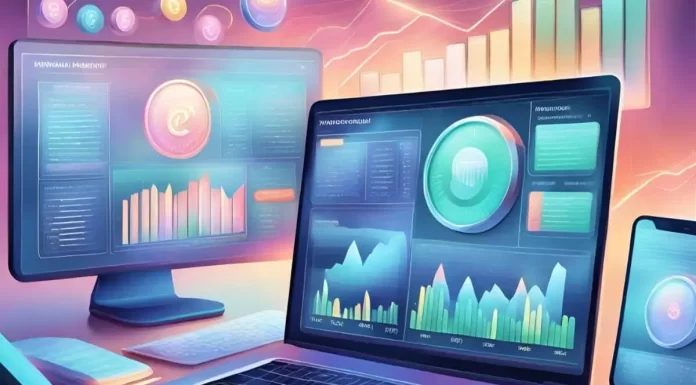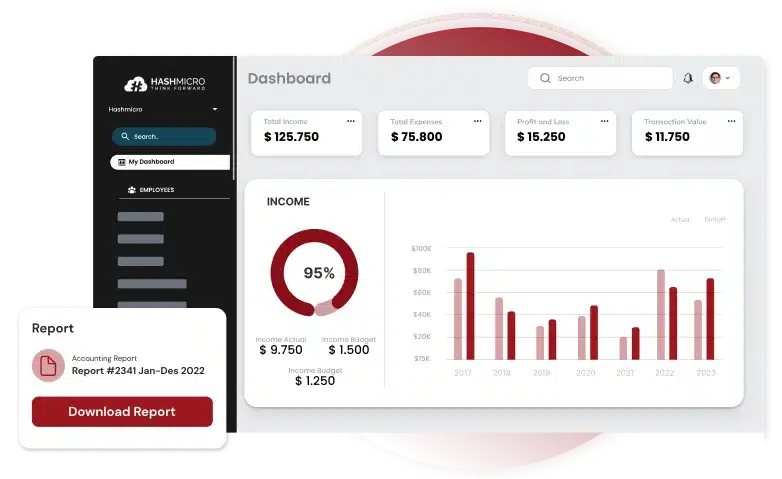Managing a business without a system is like trying to fill a jar with water while blindfolded: you won’t know when it’s full, where it’s leaking, or how much is being wasted. That’s why every successful business needs a solid accounting system.
It’s not just about recording income and expenses. A good system gives structure to your finances, from daily sales to annual taxes, so you can clearly see where your money’s coming from, how it’s being spent, and what needs adjusting.
If your current setup isn’t giving you that kind of clarity, you can try Accounting Software. It automates financial tracking, streamlines reporting, and helps you stay one step ahead of cash flow issues and tax season stress.
In this article, we’ll break down what an accounting system software really does, how it solves common financial challenges, and why the right software can boost productivity and decision-making for your business.
| Aspect | Accounting System | Accounting Information System (AIS) |
| Purpose | Records and manages financial transactions. | Processes, stores, and shares financial data in an integrated way. |
| Method | Manual or basic digital recording. | Technology-based system with software and hardware. |
| Components | Documents and transaction records. | People, processes, data, software, hardware, security. |
| Efficiency | Limited efficiency, especially if manual. | Automated, faster, more accurate, and scalable. |
| Output | Basic financial reports. | Real-time information with stronger data protection. |
Table of Contents

What is an Accounting System?
Accounting system is a method for recording a business’s financial records, including income, expenses, taxes, invoices, money from the business’s bank account, sales, and payroll. This system processes those transactions to generate reports, such as profit and loss statements and balance sheets.
A study from Acta Electronica Malaysia found that over 70% of managers in Candelaria, Quezon rely on an accounting system software to manage core functions such as accounts payable, billing, receivables, fixed assets, inventory, and payroll due to its reliability and ease of use. The research also shows that businesses using structured accounting systems experience clearer financial tracking and fewer manual errors, which helps improve efficiency in daily financial operations.
A well-organized accounting system software helps businesses maintain accurate records, stay financially organized, and make better strategic choices. Integrating AI-powered financial management further enhances this by automating routine tasks and providing predictive insights for more informed decision-making.
Features of Accounting Software
Accounting software should possess a range of features and functionalities to meet the diverse needs of businesses. Here are some essential features of an accounting system that businesses typically require:
- Expense tracking: The software should allow users to categorize expenses, capture receipts electronically, and reconcile expenses with bank transactions. Advanced expense tracking functionalities may include mileage tracking, vendor management, and approval workflows to streamline expense management processes.
- Invoicing and billing: It should support customizing invoices with company branding, itemizing products or services, and integrating with payment gateways for seamless transactions.
- Payroll management: The bookkeeping system should offer payroll processing capabilities, including calculating wages, managing deductions and benefits, generating pay stubs, and filing payroll administration Philippines taxes.
- Risk management and compliance: It aids in risk management by maintaining accurate records and automating compliance tasks. It helps identify potential risks and ensures regulatory compliance, safeguarding assets and maintaining stakeholder trust.
- Revenue management: This software provides insights into sales performance, pricing strategies, and customer profitability. It enables revenue tracking, forecasting, and analysis to facilitate revenue enhancement and cost reduction efforts.
- Financial reporting and analysis: Standard reports such as income statements, balance sheets, and cash flow statements should be available, along with customizable reporting options to meet specific business requirements.
Accounting software should offer a comprehensive suite of features and functionalities that address the diverse needs of businesses, from basic accounting tasks to advanced financial management and analysis capabilities.
Benefits of Accounting Systems for Businesses
A computerized accounting system software is important in modern business operations, offering benefits that contribute to efficiency, accuracy, and strategic decision-making. Here are some key reasons why accounting software is essential for businesses:
- Automation of financial processes: Accounting software automates repetitive tasks like invoicing, payroll, and 2 way matching. This software saves time and reduces errors associated with manual data entry.
- Enhanced accuracy and compliance: By minimizing errors and ensuring consistency in data entry, accounting software helps businesses maintain compliance with basic accounting guidelines and tax regulations to reduce the risk of penalties.
- Real-time financial insights: Accounting software provides visibility into key financial metrics and trends, enabling businesses to identify growth opportunities, allocate resources effectively, and mitigate risks.
- Scalability and flexibility: Accounting software adapts to evolving business needs and seamlessly scales to support growth, whether expanding into new markets, adding product lines, or adjusting organizational structure.
By automating key functions, ensuring compliance, and offering real-time insights, these systems empower businesses to allocate resources efficiently and adapt to growth with confidence. Leveraging accounting software ultimately leads to a more agile and resilient business capable of meeting changing market demands.
Accounting System vs. Accounting Information System (AIS)
An accounting system is a way businesses record and manage financial activities, like tracking income, expenses, assets, and liabilities. It can be done manually (using paper) or digitally (with software). Its main job is to organize and summarize financial data for reporting purposes.
An accounting information system (AIS), on the other hand, is a more advanced version that uses technology to handle financial data. It doesn’t just track and record finances—it also processes, stores, and shares the data, making it more accessible and efficient. An AIS includes:
- People: Those who use the system.
- Processes: Steps to collect and manage data.
- Data: All the financial information.
- Software: Tools to process the data.
- Hardware: Computers and networks that run the system.
- Security: Safeguards to keep data accurate and safe.
Key Difference
| Aspect | Accounting System | Accounting Information System (AIS) |
| Purpose | Records and manages financial transactions. | Processes, stores, and shares financial data in an integrated way. |
| Method | Manual or basic digital recording. | Technology-based system with software and hardware. |
| Components | Documents and transaction records. | People, processes, data, software, hardware, security. |
| Efficiency | Limited efficiency, especially if manual. | Automated, faster, more accurate, and scalable. |
| Output | Basic financial reports. | Real-time information with stronger data protection. |
Types of Accounting Systems
Accounting systems can be classified in different ways depending on how financial transactions are recorded and managed. Each type offers a distinct level of detail, accuracy, and operational complexity, so understanding these classifications helps businesses choose the system that best fits their needs. Broadly, accounting systems are grouped based on how entries are recorded and the method used to process financial data.
1. Based on How Entries Recorded
Based on how entries are recorded, there are two main types of accounting systems: single-entry and double-entry. These approaches vary in accuracy and detail—single-entry records each transaction once, while double-entry records it twice, as both a debit and a credit. This structure helps maintain balanced accounts and produces more reliable financial information.
| Type | Description | Best For |
| 1. Single-Entry Accounting | Records each transaction once, either as income or expense. Simpler but less detailed. | Small businesses with simple financial needs. |
| 2. Double-Entry Accounting | Records both debit and credit for every transaction, keeping accounts balanced and accurate. | Growing businesses that need higher accuracy, fraud control, and complete financial statements. |
2. Based on Method Used
Based on the method used to process financial data, accounting systems can be divided into three categories: manual, computerized, and cloud-based systems. Each method differs in terms of speed, accuracy, and the level of technology required. Manual systems rely on handwritten ledgers, computerized systems use installed software, and cloud-based systems operate online for real-time access. These three methods offer businesses different levels of efficiency and flexibility depending on their operational needs.
| System Type | Explanation |
| 1. Manual System | Transactions are recorded by hand in physical ledgers. Simple but time-consuming and prone to errors. |
| 2. Computerized System | Uses software to record and store transactions quickly, automating tasks like payroll, accounts payable, and revenue recognition through specialized revenue recognition software. |
| 3. Cloud-Based System | A computerized system hosted online, accessible anywhere, and designed to support a flexible, cost-effective accounting process for financial management. |
How Accounting System Works
Accounting information system uses various technologies to automate and streamline financial processes, enabling businesses to manage their finances more efficiently and effectively. Here’s an overview of how accounting software typically functions:
- Data entry: Financial administration platform allows users to input financial transactions electronically, covering sales invoices, payments, and journal entries.
- Automated recording: Some software automates data entry through features like OCR and bank feed integration.
- Processing: The system processes transactions based on set rules and categorizes them into relevant accounts.
- Classification: Automated workflows ensure consistent and accurate transaction classification.
- Calculations: The software calculates sales revenue, taxes, and account balances from the entered transactions.
- Posting: It automatically posts calculated values to the general ledger, reducing errors and improving efficiency.
These systems save time and reduce errors by streamlining data entry, ensuring consistent classification, and providing reliable calculations. Ultimately, bookkeeping systems empower businesses to focus on strategic growth.
Signs that Your Business Needs Accounting System
Several signs or problems can emerge within companies that signal the need for accounting software. Here’s a closer look at some of these indicators:
1. Manual data entry errors
If your company is experiencing frequent errors in financial records due to manual data entry, it may be a sign that you need accounting software. Manual entry is prone to mistakes, leading to inaccuracies in financial reports and potential compliance issues.
2. Time-consuming processes
If your employees spend excessive time on repetitive accounting tasks such as invoicing, reconciliations, or generating reports, this indicates inefficiencies in the process. Accounting software can automate these tasks, saving time and improving productivity.
3. Difficulty in tracking expenses
Companies struggling to track expenses effectively, especially in cases where there are multiple payment methods or reimbursement processes, may benefit from accounting software. These systems streamline expense tracking, categorization, and reconciliation, providing better visibility into spending patterns.
4. Limited financial insights
Businesses that lack real-time access to financial data or struggle to generate comprehensive reports may find it challenging to make informed decisions. Accounting software provides timely and accurate financial insights, enabling better decision-making and strategic planning.
5. Lack of integration
If your company’s accounting system software operates in isolation from other business functions such as stock control management, sales, or CRM, it can lead to data silos and inefficient workflows. An integrated, robust accounting system facilitates seamless data exchange between systems, improving operational efficiency and accuracy.
6. Dependency on paper-based records
Relying on paper-based records or outdated accounting methods can hinder productivity and increase the risk of data loss or theft. Accounting software digitizes financial records, providing secure storage, easy retrieval, and backup options to safeguard critical information.
If you need a guide to accounting software that can provide you with more well-rounded choices of the most well-known accounting system software in the Philippines, read further on the Accounting platforms for Philippine businesses for Filipino businesses here.
HashMicro Accounting Software as a Comprehensive Financial Management Solution
HashMicro offers the best accounting system softaware in the Philippines, designed to simplify and automate accounting processes for businesses of all sizes. It offers many features to facilitate efficient transaction tracking, invoicing, expense management, payroll processing, tax compliance, and financial reporting.
HashMicro is a principal company known for its standardized systems and commitment to delivering high-quality solutions. Trusted by over 1,750 clients, it proves HashMicro Accounting Software’s credibility and effectiveness in meeting businesses’ diverse needs.
This software covers end-to-end business processes, offering comprehensive features, such as:
- Transaction tracking: Effortlessly track and record all financial transactions in real-time, whether you’re using single-entry or double-entry accounting for precision.
- Invoicing: Simplify your payment process by creating, sending, and managing invoices with ease.
- Expense management: Gain control over business expenses, helping you stay within budget and keep your finances healthy.
- Payroll processing: Automate payroll calculations to ensure timely and accurate payments for your employees.
- Tax compliance: Easily stay BIR-compliant by automating tax invoice calculations and reports, ensuring you’re always in line with local regulations.
- Financial reporting: Get valuable insights with detailed financial reports that help you track and improve business performance.
- Integration capabilities: Seamlessly integrate with systems like manufacturing, sales, purchasing, CRM, and HRM, creating a unified platform for managing your entire business.
- Bank Reconciliation: Matches internal records with bank statements to identify discrepancies and ensure accuracy. Integration with bank reconciliation software enables automatic data import, real-time matching, and faster error detection.
With its comprehensive features and high adaptability, HashMicro helps businesses enhance productivity and competitiveness in the dynamic market through effective and accurate corporate financial management.
Interested in discovering how much HashMicro’s robust accounting software will cost your business? Try our pricing calculator for a personalized estimate now by clicking below.
Conclusion
An accounting system helps businesses manage finances, make better decisions, comply with regulations, and plan strategically. It simplifies tasks like tracking transactions, managing expenses, handling payroll, and ensuring tax compliance, which helps businesses stay accurate and competitive.
HashMicro offers an all-in-one ERP solution that includes all the essential features mentioned above. HashMicro Accounting Software allows businesses to simplify their accounting processes, gain actionable insights, and confidently drive growth.
Discover how HashMicro’s solution can revolutionize your financial management processes and try the free demo now!
FAQ about Accounting System
-
What are the top accounting software options available in the Philippines?
The Philippines offers several robust accounting software options tailored to meet local business needs. Popular choices include HashMicro, known for its robust and comprehensive customizable features; QuickBooks, known for its user-friendly interface and comprehensive feature set; Wave, which is free and ideal for small businesses; and MYOB, which offers efficient bookkeeping and tax management capabilities.
-
How do cloud-based accounting systems benefit businesses in the Philippines?
Cloud-based accounting systems offer numerous benefits to businesses in the Philippines. These benefits include:
1. Enable real-time processing and data handling.
2. Improve accessibility, allowing use from any device with an internet connection.
3. Include features like automated backups and data recovery.
4. Streamline accounting processes.
5. Enhance data security to protect financial information.
6. Support remote work capabilities. -
What should businesses consider when integrating an ERP system with their accounting system?
When integrating an ERP system with accounting software, businesses should consider the compatibility of the ERP system with existing accounting solutions, the ability to handle multi-company and multi-currency transactions, and the ease of integration with other business processes.
-
What are the common challenges faced by businesses in the Philippines when using accounting system?
Businesses in the Philippines face several challenges when using accounting software, such as:
1. Requires a stable internet connection for cloud-based solutions.
2. Challenges in navigating complex software interfaces.
3. Insufficient training on software usage.
4. Lack of specific features needed for diverse business operations.
5. Importance of selecting software tailored to the business’s specific needs.
{
“@context”: “https://schema.org”,
“@type”: “FAQPage”,
“mainEntity”: [
{
“@type”: “Question”,
“name”: “What are the top accounting software options available in the Philippines?”,
“acceptedAnswer”: {
“@type”: “Answer”,
“text”: “Several accounting software options are widely used in the Philippines to support local business needs. Popular choices include HashMicro for its customizable and comprehensive features, QuickBooks for its user-friendly interface and broad functionality, Wave as a free solution for small businesses, and MYOB for efficient bookkeeping and tax management.”
}
},
{
“@type”: “Question”,
“name”: “How do cloud-based accounting systems benefit businesses in the Philippines?”,
“acceptedAnswer”: {
“@type”: “Answer”,
“text”: “Cloud-based accounting systems benefit Philippine businesses by enabling real-time data processing, improving accessibility from any internet-connected device, supporting automated backups and data recovery, streamlining accounting workflows, enhancing data security, and supporting remote work operations.”
}
},
{
“@type”: “Question”,
“name”: “What should businesses consider when integrating an ERP system with their accounting system?”,
“acceptedAnswer”: {
“@type”: “Answer”,
“text”: “When integrating an ERP system with an accounting system, businesses should evaluate system compatibility, support for multi-company and multi-currency transactions, scalability, and how easily the ERP integrates with other core business processes.”
}
},
{
“@type”: “Question”,
“name”: “What are the common challenges faced by businesses in the Philippines when using accounting systems?”,
“acceptedAnswer”: {
“@type”: “Answer”,
“text”: “Common challenges include reliance on stable internet connections for cloud-based systems, difficulty navigating complex interfaces, limited user training, missing features for specific business needs, and the importance of selecting accounting software that aligns closely with operational requirements.”
}
}
]
}






















